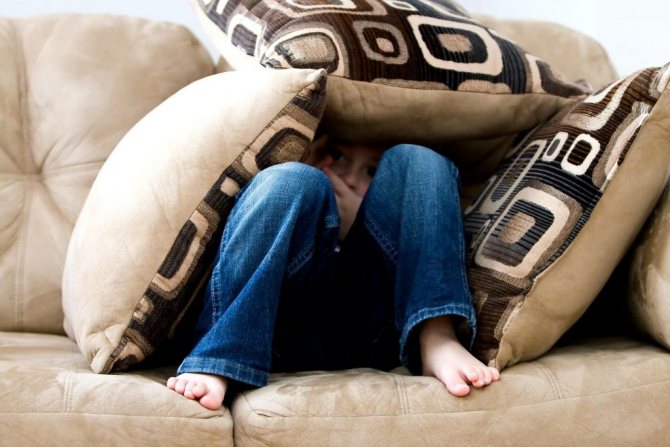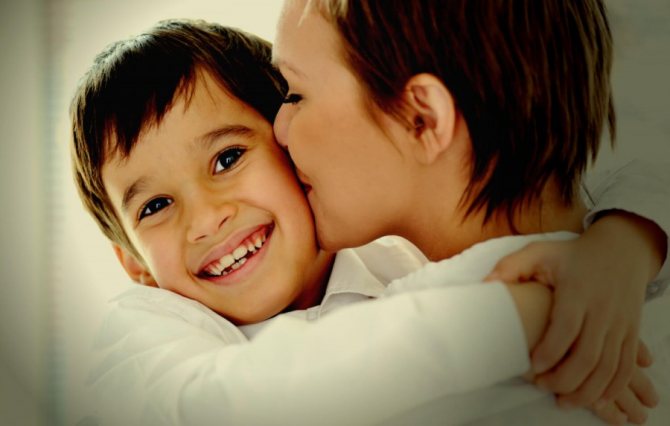Types and purposes of children's lies
Children's lies have different reasons. Most often, the type of lie is determined by the goal pursued by the child:
- Tendency to fantasize or “play lies”
The school curriculum includes a wonderful work by Nikolai Nosov - the story “Dreamers”. It talks about two boys who brag among themselves: one flew to the moon, the other swam the ocean...
- We can hear similar stories from our children.
It is worth noting that such stories cannot be called lies in the literal sense of the word. Rather, we are talking about the child’s rich imagination and his creative abilities.
- Lies associated with fear
This is a very common type of lying among children. This type of distortion of reality occurs as a result of the child’s desire to avoid punishment or reprimand (most often from parents).
- Elaborate lies
When using a lie strategy, children most often have a specific goal. The most common option is the pursuit of any material goods (money, toys, “goodies”, etc.)
How to understand that a child is deceiving his parents - signs

The most common signs by which you can understand that a child is not telling something, or is quite openly lying, include:
- deviates from the interlocutor;
- “hugs” himself;
- sharply “throws” the head back or tilts it down, to the side;
- hides his gaze, does not look into the eyes;
- during a conversation he often coughs, swallows, etc.;
- twirls something in his hands (pencil, eraser, etc.);
- often touches the nose, rubs the forehead, eyes, chin or fiddles with the earlobe;
- covers his mouth;
- scratches the neck or “adjusts” the collar;
- “hides” behind some objects (table, soft toy, etc.);
- chooses a static pose (without movements);
- pauses before telling a lie;
- says a lot of details, wanting to hide the lie.
Reasons for children's lies
In fact, telling lies is prompted by deep childhood experiences that cannot be ignored. Professionals in the field of child psychology believe that the main reasons for lying can be:
Fear of being punished for any misconduct or failure to comply with parental requirements. In this case, parents should be more attentive to their children and not make excessive demands, contributing to the generation of lies.

Low self-esteem. In order to look decent among their peers, children are able to embellish their advantages by inventing the existence of various expensive things in their possession or famous relatives. If this happens constantly, then you cannot turn a blind eye to it. Immediately find out all the circumstances that push the child to such actions.

Control and pressure from parents. As a rule, children aged 12-13 years begin to lie to their parents, protesting against their pressure, comprehensive control and interference in their personal space. In this case, it is worth letting go of the reins of control a little, giving the child more independence, but without losing control of the situation.

The desire to set your own boundaries. Teenagers do not like to talk about personal things, so they come up with various fables for their parents. Don’t put pressure on children, be patient, find a way to provoke a frank conversation or awaken a desire to open up first, share with a loved one, since the psychology of children’s lies is very subtle. It is important that your child trusts you.

Family problems. Children experience conflicts in the family very emotionally, so they resort to various methods (including lies) to draw attention to themselves.

In any case, the main provocateur of lies is fear. Parents can forbid playing on the computer, communicating with friends, leaving the house, they can resort to punishment, all this frightens the child and pushes him into a web of lies. Therefore, it is important to maintain a trusting relationship between parents and children.
Why does a child lie?

Main reasons
Psychologists identify several main reasons for children’s lies:
- Fear of punishment
When a child realizes that he will be punished for one or another “misdemeanor,” he finds a way out of this situation - to tell a lie and thus avoid punishment.
- Become a better person in the eyes of others
Children often use lies to increase their status and assert themselves. They tell their peers about their parents’ fictitious incomes, unprecedented travels, etc.
- Lying as setting personal boundaries
Children often use lies when asserting and protecting their personal boundaries when they understand that their parents demand too much or exert too much control.
- Distrust of adults, family problems
If a child lies a lot, this often indicates internal family problems. In such cases, theft and vandalism are added to the lies, with the help of which children “cry for help.”
- Lies as a form of protest
The use of lying can often be seen in cases where a child “challenges” the authority of an adult.
Age characteristics

24 years
At this age, the baby learns about the world around him. At this stage, the child fantasizes a lot, with the help of fantasies he colors his reality. All fantasies at this age are harmless. Do not interfere with the little inventor, but on the contrary, help him. Offer to draw an “invented hero” or sculpt him from plasticine.
4-5 years
At this age, the child is not yet able to separate reality from lies. If you deceive him, he sincerely believes. A parent who tells a lie forms a similar model of behavior in his child. The kid begins to use lies, although there is no particular need for this. Most often this happens if the child is afraid of causing his mother’s disapproval. At this age, he interprets this disapproval as dislike. It is much easier for him to lie than to hear that they don’t like him, that he is bad.
7-8 years

A very important and turning point. The child becomes a schoolchild: on the part of the parents - less control, more freedom. When communicating with peers, you want to appear better, bolder, stronger. Boasting is ideal in this case; this is what the younger student begins to actively use. In addition, if a child receives not very good grades, he often tries to hide them by simply not talking about it. He keeps them quiet.
Don't miss this moment. Talk to your child and explain that your love is not related to marks in the diary, and that he is no worse than other children in the class!
9-10 years
In order to win the most significant place among his peers, the child begins to actively lie. He already understands well the difference between truth and falsehood, but this does not stop him: incredible stories about travel, prestigious jobs of his parents, cool gadgets, etc. - this is only a small fraction of all kinds of fables of a child of this age.
11-12 years old
At this age, children's lies are closely related to the critical level of trust in the family, and can also be a consequence of strict upbringing.
At this age, a teenager sees a clear line between truth and lies. He will lie consciously, pursuing a specific goal. There can be many reasons: lack of attention, self-affirmation, fear of humiliation, protection of personal boundaries and much more.
Do you suspect that your child is telling a lie?The application “Where are My Children” will help you figure it out | ||
What to do if a teenager (7-9 years old and older) cheats?
When children reach adolescence, very often the reason for their lies is the desire to create a personal space for themselves, a territory independent of adults, where only the child himself will be the owner.
And your task is to provide this territory to your teenager. Within reasonable limits, of course. But to give the child a real feeling that he has moved to a new stage of growing up.
Mom and Dad understand this. And we are ready to build relationships with him on a new level. But greater independence is not synonymous with permissiveness. Therefore, it is important here to clearly outline the scope of a teenager’s independence at this age stage.
And it is even more important that the child himself agrees with these frameworks. Discuss and be prepared to compromise. You can even enter into a written agreement. An agreement between two parties, when tangible, is more powerful.
If a teenager is sure that his parents love him, that they act only in the interests of his well-being, that they are always ready to listen, understand and forgive, he will not lie even if some agreements are violated.

Mom and dad, create a trusting relationship in the family, become not only mentors, but friends for your child, and he will simply have no reason to tell you lies!
A child can be honest with his parents
- When he is not afraid of punishment, anger and loss of love from those closest to him.
- When he is sure that he will not be humiliated, no matter what happens.
- When he knows that his parents will support him in any situation.
- When you don't skimp on praise and encouragement.
- When there is trust and mutual understanding between you and the child.
And never forget about personal example. How sincere, honest and open you are, the more your children will inherit these qualities from you. Create an atmosphere of agreement and harmony in your family. And then its small members will not seek salvation from adversity and loneliness in lies...
Sources of lies

Lack of attention
If a child tells everyone stories about how wonderful his life is, what a happy and friendly family he has, how his parents love him, this is a reason to think about your relationship. Perhaps the child does not have enough attention, and he talks about what he would really like to have.
Unnecessary criticism
If parents criticize their child a lot, they thereby cause a decrease in the child’s self-esteem and contribute to the development of various complexes. The child becomes unsure of himself and dissatisfied with himself. In this case, children use lies to change the situation and become worthy of respect.
Excessive severity

In cases where parents raise a child in strictness and punish him for all his mistakes and misdeeds, it should not be surprising that the child uses lies as a defense and thus tries to avoid punishment.
Restrictions on the expression of emotions
It is often difficult for an adult to control his emotions, let alone a child. If parents begin to prevent the child from venting his negative emotions and let him know that they only want to see him “good and obedient,” then the child will withdraw into himself. He will lie about his thoughts, feelings and desires, trying to please his parents.
"Play on feelings"
If parents demonstratively show how upset or upset they are by the child’s low performance, bad behavior, etc., then they themselves provoke the child to hide the truth, keep silent, lie, so as not to upset the parents.
How to stop a child from lying - advice from a psychologist

First of all, parents should remember that a lie for a child is an opportunity to release internal conflict, as well as to find a lifeline in a hopeless situation.
For a parent, a child’s lie is most often a “cry for help,” an SOS signal, a reason to pay closer attention to a seemingly successful and happy child.
What should parents of children do if lying has become an integral part of their lives?
What to do and how to react to parents

Each case of a lie occurring in a child’s life is unique, but there are still some “general” steps towards correcting the current situation.
- Clarify the reason for children's lies
Parents who have caught their child in a lie, trying to correct the situation, often begin with reproaches and punishments, which only leads to an increase in the conflict situation. The correct and effective way out of the situation is to establish relationships with the child and establish trust.
- Analysis of your own behavior
It is very important to analyze your own behavior, pay attention to the changes that have occurred in your relationship with your child and answer the question: “What has changed in my behavior and our communication?”

Besides:
- Try to “get away” from punishment. Fear is the main driver of children's lies. Experiencing fear, the child begins to look for options to avoid any punishment and sees the alternative in lies.
- Do not shift your unrealized plans onto your child and do not expect him to be successful in all endeavors. This turns out to be too heavy a burden, which most children, unfortunately, cannot cope with.
- Don't make empty promises to your child. Children, like a sponge, absorb parental behavior. If you allow promises not to be kept, as well as outright lies, then don’t expect your children not to echo you.
- “Listen” to lies
You should also pay attention to how the lie actually manifests itself and what it is connected with. Perhaps the child is trying to lie through lies, talking about his desires, or, conversely, about what worries him.
How to prevent lies?
Measures to prevent lying in children:
- don't lie yourself;
- don't promise what you can't deliver;
- do not allow aggression, assault, do not raise your voice during conversation and do not shout;
- establish a trusting relationship with the child;
- do not compare your son or daughter with more successful peers;
- take his opinion into account, but do not overprotect him;
- Participate in solving your child's problems so that he does not feel lonely.
Parents must remember that children are the closest and dearest to you; say as often as possible how much you love and worry about them. Show concern for all family members, including grandparents. Do not ignore the comments of elders in the presence of children, otherwise the opinion will be formed that such behavior is the norm. If a son or daughter has done something wrong, then one should not remember this for a long time, reminding them of the incident on opportune occasions. After all, even criminals in prison have the right to amnesty. It is necessary to reprimand for the offense, but not to transfer to the child’s personality.
Always remember that it is necessary to develop trust and equality, which are the basis of relationships in the family. Sometimes children tell white lies so as not to upset others. If the donated item is not liked, then people lie. This is the so-called “white” lie that does not harm anyone. Still, punishment is not the best choice against lying. According to psychologists, the search for the root cause is much more important than the lie itself, which simply pisses off adults. The way out here is this: try not to let anger and frustration escape, and there is no need to react to irritation.
Never punish rashly, do not let deception get away with it, otherwise impunity will make lies a system. After all, if you start small, nothing can stop the deception. The most important thing is to explain to your child that he is being punished for lying. Parents must look at the world through his eyes and remain on his side. Demonstrate your ability to forgive. The child must see that your love is unconditional.
Tags:Liar
We also recommend reading on this topic:
- What is adolescence and how long does it last?
- Conflict between student and teacher
- Why doesn't my child want to go to school?
- Note: how to survive your daughter’s adolescence at 13 years old











